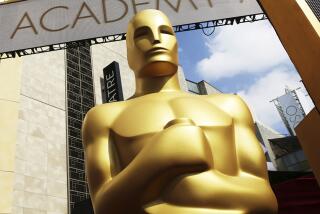Newscaster Bill Welsh, head of the Hollywood Chamber of Commerce, is starry-eyed over future of the boulevard
- Share via
If you saw him walking down Hollywood Boulevard you’d say, “Who is that man? I’ve seen his face a thousand times.”
He would be Bill Welsh, the veteran KTTV all-purpose reporter-announcer who is president of the Hollywood Chamber of Commerce.
I had lunch the other day with Welsh in the Musso & Frank Grill. Musso’s opened in 1919 at 6669 Hollywood Blvd. It expanded in 1936 to 6667, where it has been ever since. It still has its original wood booths. If the waiters aren’t the originals, they may be their sons. It has been a favorite with movie people for almost 70 years.
I recalled that back in the 1950s, when television was new, Welsh covered everything from cats up a tree to the Tournament of Roses Parade.
“I’ve covered that parade for 40 straight years,” he said. “I’m going to try for 41.”
He doesn’t think television is as much fun as it used to be. “It’s so structured, so planned, so contrived. The excitement of the early days is gone almost completely.”
Welsh thinks the boulevard is coming back. He thinks the elimination of prostitutes has done a lot to clean it up. The chamber gave the police $15,000 for a computer that turns up prior convictions and parole violations in a few seconds, thus keeping many more prostitutes off the street.
“They can’t survive in jail,” he said. “We get complaints from San Diego. They say, ‘What are you doing--giving prostitutes bus tickets to San Diego?’ ”
I wondered if they picked up many young runaways on the street.
He nodded. “Hollywood has an obligation to young people who come here seeking fame. We make ourselves glamorous, make it a dream world where everything can happen. A girl plays the lead in her high school play in Idaho, everyone says, ‘Hey, you oughtta go to Hollywood.’ She comes here, not knowing that hundreds of other high school girls also played the lead in their high school plays. She ends up a prostitute. We have an obligation to see that these kids are sent home.”
In this work, he said, the police are helped by Traveler’s Aid, Option House, and Children of the Night.
Welsh got into radio and television accidentally. As a kid he lived across the street from the Colorado Teachers College in Greeley, Colo. He always wanted to go to that college. When he did, they put him in charge of athletic events. He worked the public-address system, and that led to a job on local radio, at $7 a week. When he left they owed him $22. Years later, when he was a star at KTTV, he mentioned the $22 in a Times interview and got a $22 check from the Colorado station.
Welsh thinks the boulevard has had a bum rap. “The dateline Hollywood is magic in newspapers. As Fred Bonfils (celebrated publisher of the Denver Post) once said, ‘A dogfight in Denver is bigger than a war in Europe.’ Whatever happens in Hollywood gets more attention than it should.”
I told Welsh I had received a letter from Toni Gerry Stiller (the former actress Toni Gerry), who quit Hollywood to marry Harold Stiller, nephew of Mauritz Stiller, the Swedish director who brought Greta Garbo to America.
Mrs. Stiller had read in my column that there is a star on the boulevard’s Walk of Fame for Maurice Diller, whom nobody knows, but none for Mauritz Stiller. She wondered what could be done about it.
Welsh admitted that Maurice Diller was probably supposed to have been Mauritz Stiller, but someone misspelled the name. He said it costs $3,500 to put a star in the walk--”for the red carpet, the platform, the sound system, the banner across the street, the permit.”
He said the slight to Stiller could be redressed if the Swedish community would come up with the money.
Most of the stars are paid for by fans, peers, fan clubs. Whose stars go in is decided by a five-member committee representing the various entertainment fields. Johnny Grant, mayor of Hollywood, is chairman; all other members remain anonymous.
“The pressure on them is tremendous,” he explained. “They get 400 requests a year.”
There are 250 spaces left. He said the chamber would like to raise $300,000 to extend the walk from Sycamore to La Brea, adding 150 stars. “But I don’t expect to be around for that.”
Welsh has always been Hollywood-struck. When he was a kid in Greeley, working at a soda fountain, he would come home, tune in KFI and listen to Phil Harris and his band at the Cocoanut Grove.
“I thought if I could ever get there, my life would be complete.”
Now, he added sadly, the Ambassador Hotel, and the Grove, appear to be doomed.
He is excited about the restoration of the Brown Derby restaurant in place of a McDonald’s on the northwest corner of Hollywood and Vine. It will have the black leather booths and caricatures for which its forerunner was famous. ‘We’re trying to get permission to put the old Brown Derby hat (from the Wilshire Boulevard restaurant) on top of it. It’s in storage someplace.”
He is also excited about the imminent ground-breaking for the $150-million Hollywood Promenade. The final legal obstacle has been removed. The Promenade will include a five-story underground garage, cinemas, restaurants, stores, office space, a 400-room hotel and the long-awaited Hollywood Museum. It will wrap around and preserve the Chinese Theater.
He said, “People tell me, ‘I’m walking the boulevard again.’ ”
More to Read
Sign up for Essential California
The most important California stories and recommendations in your inbox every morning.
You may occasionally receive promotional content from the Los Angeles Times.













